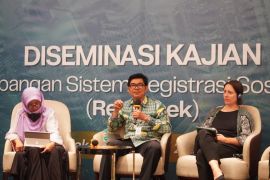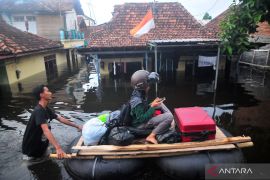According to senior researcher Sukamdi of the Center for Population and Policy Studies (PSKK) of the Gadjah Mada University (UGM), the country is actually going to face a big problem.Jakarta (ANTARA News) - Indonesia is facing the problem of a growing number of elderly people who are expected to reach over 32 million in the next two decades.
Indonesias elderly in 2010 was 4.9 percent, or 11,878,236 people, and this number is projected to increase to 10.8 percent, or 32,112,361 people in 2035.
According to senior researcher Sukamdi of the Center for Population and Policy Studies (PSKK) of the Gadjah Mada University (UGM), the country is actually going to face a big problem.
"The same issue also occurs in other countries such as Japan. However, there is no awareness of the fact that we have a big problem with the elderly. In my view, Indonesia has not shown a sufficient response to the problem of the elderly," Sukamdi said at the UGM campus Saturday.
The data at the UGMs PSSK on Indonesias Population projections from 2010 to 2035 indicate that the percentage of the elderly population will increase to 100 percent, he said.
In 2010, the percentage was 4.9 percent, or 11,878,236 people, and this number is projected to increase to 10.8 percent, or 32,112,361 people, in 2035.
The post-productive age group or age older than 65 years, has now become an important issue because it could become a potential or expense in the human life cycle as a whole, according to him.
"If in the current productive age a person, he or she, is capable of saving, then when he or she becomes older or no longer productive in terms of the economic aspect, he or she will not become a burden to the state," he said.
Anyone being old or being elderly will face three gaps, he said.
First, the geographical gap, namely the relationship or the physical encounters between parents and children will be increasingly rare, he said.
Second, the cultural gap, namely the differences in perspectives and values between parents and children.
Third is the economic gap.
"The third gap is being faced increasingly by the elderly. We heard the news yesterday, that in Condong Catur there was an elderly person who died but it was only five days later that the family and neighbors came to know. This is just one example, but in fact there have been several similar cases," Sukamdi said.
Regarding the elderly, the Office of the High Commissioner for Human Rights strives to ensure that neglected population groups are given space and weight in the human rights agenda, and that governments take all measures required to protect and promote their human rights.
The Indonesian government through the Ministry of Social Affairs has prepared the Assistance for the Elderly (Aslut) but for the time being it has reached only 30,000 neglected elderly.
Next month in November 2016 the assistance will reach 125,000 neglected elderly over 70 years by involving them in the Family Hope Program (PKH) in order to receive Rp200,000 per month, each.
With the Family Hope Program, the social affairs minister says the government will reach 155,000 needy elderly, although the number is still far from the overall number of neglected elderly.
Currently, the overall number of neglected elderly is recorded at 1.8 million, and 1.6 million of whom are potentially displaced in the face of the demographic bonus, expected to lead to a positive impact on economic development and progress in the field of agriculture and industry.
In the meantime, all ASEAN member countries are facing the same social issues related to the social welfare of children, the elderly and persons with disabilities.
"The ASEAN countries, including Indonesia, are dealing with issues connected to the protection of children, elderly and disabled," Social Affairs Minister Khofifah Indar Parawansa said at the ninth ASEAN Regional Meeting on Development and Social Welfare in Jakarta late last month.
Earlier, Khofifah, along with several of her counterparts from the ASEAN countries and China, Japan and South Korea, discussed many such social problems.
The minister said the ASEAN countries are facing a variety of issues related to children, including the problem of online pornography. A proposal to stem this problem has been initiated Malaysia with a proposal.
"There was a recommendation at a meeting about children held last June in Vietnam. Many countries are facing such problems, as also those related to protection of abandoned children," Khofifah noted.
She added that inputs given by ASEAN and three Asian countries which participated in the meeting emphasized the importance of checking child trafficking and ensuring childrens education, including quality standards in early childhood education and parenting.
Most ASEAN countries will have a large number of the elderly people, and, therefore, should take measures to facilitate them in their daily life, especially those who are active and productive.
"Some programs have been carried out well in Japan, China and South Korea and will be a basis to strengthen cooperation among the ASEAN and the three countries on the issue," the minister concluded.(*)
Reporter: Andi Abdussalam
Editor: Heru Purwanto
Copyright © ANTARA 2016











